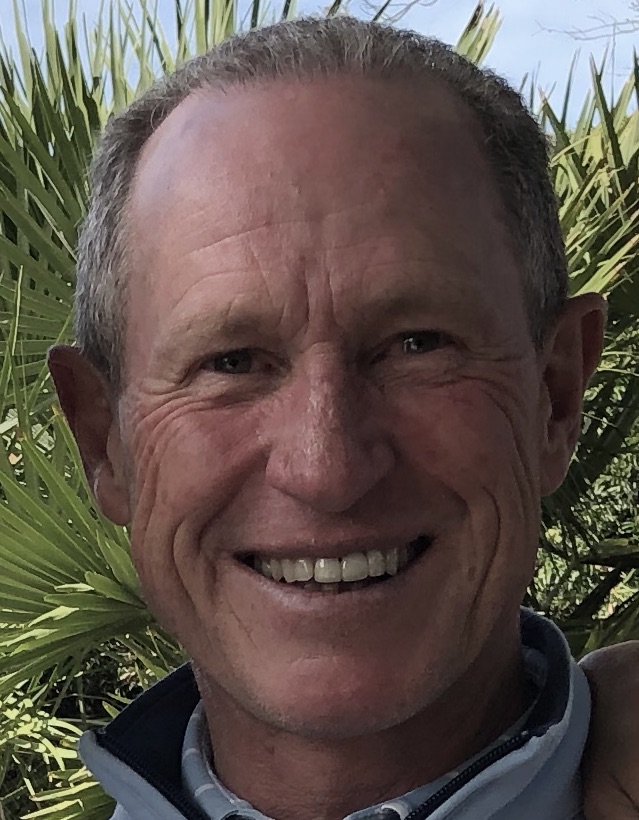 Program chair David Fain introduced Steve Griessel, Managing Owner, Betz Family Winery who returned to Rotary to describe how his winery survived COVID restrictions and smoke impact on their 2020 release. During his first appearance, he offered an overview of the winery that was established in 1997. His turn at the podium this time focused on how the winery survived during these uncertain times of virus and smoke.
Program chair David Fain introduced Steve Griessel, Managing Owner, Betz Family Winery who returned to Rotary to describe how his winery survived COVID restrictions and smoke impact on their 2020 release. During his first appearance, he offered an overview of the winery that was established in 1997. His turn at the podium this time focused on how the winery survived during these uncertain times of virus and smoke.COVID restrictions in March 2020, were a blow to Betz Winery as restaurants and public tastings closed. A second blow came as wildfires raged bringing smoke to grape growing areas of Washington state, resulting in smoke tainted grapes/juice. Smoke taint permeates the skin of the grapes and into the juice, but it does not get into the vine.
“We make small-batch wines and never cut corners - with quality trumping everything,” he said, “ and the 2020 vintage did not meet our quality standard so we decided to cancel it.”
Betz Family Winery is well known in Washington wine circles, winning awards each year. “We promised the original owners that we would never mess with the wine’s DNA,” he said. “We agonize over every decision and every barrel of wine, with zero compromises on quality.”
He described how 2020 changed the game as the impact of COVID restrictions took 35% of their business. Like many businesses the winery ramped up delivery, take out and digital programs to try and make ends meet. Smoke from wildfires then added to the challenge as ‘smoke taint’ became real with no data on whether wine grapes were impacted. Tasting and blind tastings were the only way to determine if the wine had a ‘smoke tainted taste’. Following two months of fermentation, blind tastings made it clear that the wine had a problem and a massive one. The double-blind tasting process is when a barrel from an unknown source is tasted, then the source or where that blend comes from to create a ‘control’ wine that becomes the standard for quality without getting branded wines in the mix. “We knew we had to be true to our DNA, ‘rabid’ fans, previous owners, and ourselves-- we could not bottle any of the wine,” he said. “We wouldn’t put flawed wine out there.” The winery developed a pro-active survival plan reaching out to tell grape growers, their bank, and their customers of the canceled 2020 release. The wine had a smokey flavor that varied with some slight smokey “and some that were pretty nasty. And you don’t know over time what the wine will taste like”.
The winery sent an impassioned email to customers telling them the truth about the impact of wildfire smoke on grapes AND the wine. Although he would not offer specific revenue losses, the winery lost millions by canceling the 2020 release with mixed results with the rest of the industry as other winemakers considered the Betz decision had “killed” the entire 2020 Washington wine vintage. As former Washington Wine Commission Chair and chief promoter, the decision to cancel the 2020 Betz winery vintage was difficult. “The big picture is that we lost a bunch of friends by publicly saying the 2020 vintage would not be released,” he said, “ and if you know who you are, you know what the decision is… you hope that people would understand this”.
The winery email to customers made headlines about smoke-tainted wine, and that that was unpalatable to other Washington winemakers; although smoke taint did not blanket eastern Washington. “It is difficult to understand as much as to explain the difference between wildfires that ravaged through Napa wine country compared to Washington that had hit and miss smoke taint,” he said. Planning for a worst-case scenario was difficult as Betz Family Winery was the only winery to suspend the 2020 release and unpalatable to other wineries. He concluded by saying the key was staying engaged with customers. “ We are now open to the public for buy experiences by appointment and completely new
e-commerce site to engage with our customers so they don’t forget about us,” he concluded. Meanwhile, UC-Davis and WSU wine scientists are working on ways to mitigate the smoke taint from wine grapes. “It is not like beer or spirits that can be made any time of year,” he said. “We have one shot a year to produce a vintage”.
The day’s short program featured Jim Loder of the Seattle #4 Arts Committee who was to describe his committee’s work and the value of the arts. Before technical difficulties cut his presentation short, he said 33 Rotarians were members of the art committee. His presentation will be postponed to another meeting.

